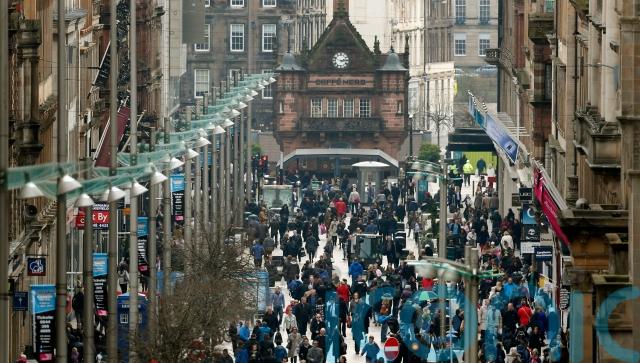
Buying a home with a mortgage in some major cities across Britain could be cheaper than renting – even with a low deposit – according to analysis by a major bank.
The analysis by Lloyds compared typical monthly rental costs with potential first-time buyer mortgage payments in 11 major cities.
In nine cities, owning a home could work out less expensive in terms of monthly mortgage payments than renting, the research suggested.
People’s individual circumstances will vary and the research made several assumptions, including that a buyer would have a 5% deposit and be paying a 4.78% interest rate fixed for five years, with a 30-year repayment term.
Lloyds used Office for National Statistics (ONS) data in its calculations for average first-time buyer property prices and average rental figures.
While the research looked at potential mortgage payments, it did not include costs such as legal fees or other ongoing costs associated with home ownership.
London was excluded from the analysis due to significantly higher property prices there and different affordability dynamics, Lloyds said.
The typical 5% deposit needed could be around £11,412, based on an average first-time buyer property price of £228,233, the research found.
Among major cities outside London, the biggest gap between owning and renting in the study is in Glasgow, with mortgage payments around 32% cheaper than rent.
Home buyers could potentially save £396 a month, or £4,752 a year, compared with renting, according to Lloyds’ calculations.
With an average first-time buyer property price of £172,000, a deposit of just £8,600 could be enough for some people to get on the ladder, it said.
Newcastle was placed second for savings, with first-time buyers paying 20% less on average for a mortgage than they would in rent – making a potential monthly saving of £217, or £2,604 a year.
With an average first-time buyer property price of £180,000, a deposit of £9,000 may be enough for some people to get onto the property ladder.

Even in cities such as Cardiff and Sheffield, where renting worked out slightly cheaper in the short-term in the Lloyds study, the longer-term benefit of building up equity in the property could outweigh the difference, the report suggested.
Amanda Bryden, head of mortgages at Lloyds, said: “We know that saving for a deposit is one of the biggest hurdles for first-time buyers.
“With rents having risen sharply over the last two years, many are already managing monthly payments that are higher than a typical mortgage.
“That’s why low-deposit mortgages could be the right solution for many – helping people move from renting to owning sooner than they thought possible.
“It’s also important to consider other upfront costs like legal fees and moving expenses – but for most, the long-term savings will outweigh these.”
While buying may be cheaper than renting in some circumstances, some people may prefer to rent for reasons such as having more flexibility and to be able to move around for work.
Ms Bryden added: “The impact of growing equity in your own home – money that would otherwise have been lost in rent – means a more secure financial future.
“For anyone thinking about buying, speaking to a mortgage adviser or broker is a great first step.”
Here are average first-time buyer house prices, followed by the typical amount needed for a 5% deposit, the monthly mortgage cost, the monthly rent, the percentage saving from having a mortgage rather than renting, the monthly saving, and the annual saving, according to Lloyds’ calculations. Where minus figures are shown, renting was found to be less expensive than mortgage payments:
Glasgow, £172,000, £8,600, £855, £1,251, 31.7%, £396, £4,752
Newcastle, £180,000, £9,000, £895, £1,112, 19.5%, £217, £2,604
Edinburgh, £243,000, £12,150, £1,208, £1,392, 13.2%, £184, £2,208
Bristol, £311,000, £15,550, £1,547, £1,778, 13.0%, £231, £2,772
Manchester, £234,000, £11,700, £1,164, £1,317, 11.6%, £153, £1,836
Nottingham, £183,000, £9,150, £910, £996, 8.6%, £86, £1,032
Leeds, £209,000, £10,450, £1,039, £1,098, 5.4%, £59, £708
Liverpool, £167,000, £8,350, £830, £864, 3.9%, £34, £408
Birmingham, £208,000, £10,400, £1,034, £1,068, 3.2%, £34, £408
Cardiff, £231,000, £11,550, £1,149, £1,138, minus 1.0%, minus £11, minus £132
Sheffield, £190,000, £9,500, £945, £893, minus 5.8%, minus £52, minus £624
Subscribe or register today to discover more from DonegalLive.ie
Buy the e-paper of the Donegal Democrat, Donegal People's Press, Donegal Post and Inish Times here for instant access to Donegal's premier news titles.
Keep up with the latest news from Donegal with our daily newsletter featuring the most important stories of the day delivered to your inbox every evening at 5pm.